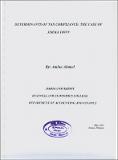| dc.description.abstract | This study was conducted with the aim of identifying the determinants of tax compliance in Jimma
town. The target population of the study was category B tax payers of Jimma town which were
1143in number. A sample of 288 category B tax payer was taken using stratified sampling
followed by random samplingfrom each strata. The category B taxpayers were stratified into trade
(retailer and wholesaler), service sector and manufacturing (process) according to their field of
work. By distributing a total of288 questionnaires to Category B sample taxpayers of the town, the
study tried to explore the main determinants of tax compliance and how these determinants are
related with tax compliance. Tables, graphs and charts were used to present the result of the
analysis. Pearson correlation matrix and Logistic regression model was used to identify the
main factors that determine tax compliance. The findings of the study shows that tax rate,
probability of detection, penalty rate, reference group and tax knowledge are the determinants of
tax compliance. When tax rate is perceived as higher and inequitable, tax compliance will
decrease: the higher the probability of detection, the lower the compliance: when taxpayers
perceived there is high penalty rate for any non-compliance, the level of compliance will decrease:
negative perception on friends and relatives result in low compliance. Lastly, taxpayers with high
tax knowledge will not comply. In general, it is recommended that the tax authority and other
responsible bodies; to increase taxpayers' awareness, study about detection methods and try to be
exhaustive in conducting detection and use trained and ethical personals, to remove misconception
of taxpayers in which the amount of tax to be paid by the taxpayers is aimed at not harming them
and is based on their ability to pay, should prevent the cause of penalty by making the taxpayers
know what results in penalty and how can it be prevented, cultivate personal awareness of
compliance and educating the whole society about benefit and importance of voluntary compliance
and conduct scientific assessment of the taxation system to investigate any loopholes. This will
help to enhance the level of compliance which helps taxpayers to comply voluntarily through all
possible ways. | en |


